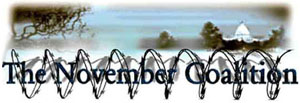March 30, 2008 -- New York Times
The Adroit Speaker Doesn’t Wing It
By Phyllis Korkki
Q. You have been asked to give a speech, and even though you’re an expert on the topic, you feel terrified. Why?
A. The reason is simple: Many people think that to give a speech is to risk being humiliated in public.
The fears that surround public speaking tend to fall into a few categories, said Linda Blackman, founder of Executive Image, a Chicago-based company that helps people make presentations. People are afraid that they will look foolish, that they will make a mistake, that they will disappoint their boss, that someone will question their expertise or that they did not prepare properly, she said.
Anxiety about public speaking is partly biological and therefore natural, said Steven A. Beebe, chairman of the Department of Communication Studies at Texas State University in San Marcos. It is prompted by the brain’s fight-or-flight mechanism, which emerges during stressful situations. Believe it or not, this reaction "is simply your body trying to help out your mind," he said.
Hopefully, your mind will respond by preparing for the speech, which will help calm your body.
Q. In preparing, should you write out the speech word for word?
A. Only if you are a president about to address the nation, or otherwise need to choose your words very carefully, Professor Beebe said.
Most experts advise making an outline with talking points rather than an exact manuscript. That way, your speech will be more conversational and extemporaneous, and you will be more likely to make a personal connection with your audience.
Q. Should you rehearse?
A. Yes. That is one of the most important things you can do to quell anxiety. Ideally, you should rehearse the speech in the same type of room where you will appear, whether a conference room or a ballroom, Professor Beebe said.
That way, when you actually give the speech, your agitated brain will be soothed by the familiarity of the environment.
Try to enlist someone -- a spouse, a friend, even your dog -- to listen to your speech, Professor Beebe said. He added that when he was a teenager growing up on a farm in Missouri, he would practice for speech contests in front of his cows.
Making videotapes and audiotapes of the speech are other excellent ways to prepare -- and they will also help you adhere to your time limit.
Q. What else should you do beforehand?
A. Ask plenty of questions, Ms. Blackman said. Where will the speech be given, and in what format? How many people will be in the audience, and who will they be? How much time will you have? Will there be time for a question-and-answer segment? If so, anticipate the questions and prepare responses in advance, Ms. Blackman said.
In addition, make sure you know how any audio-visual equipment works, she said, and have a low-tech backup plan in case it breaks down.
Q.What about other factors, like your voice, gestures and eye contact?
A. Keep in mind that people who are nervous tend to speak faster than normal and to use a monotone, Professor Beebe said. So you may need to work on slowing down and using more inflection in your voice.
Eye contact is always important, even in a room of 1,000 people, Ms.
Blackman said. Look at one person or a group of people for one sentence’s or one concept’s worth of time, she said. You don’t want to be static, but you also "don’t want your head to bounce around" as if you were watching a game of Ping-Pong, she said.
Body language -- like using hand gestures, leaning in toward the lectern or walking toward the audience -- can also enhance your connection with the audience, she added.
Q.What about using technology like PowerPoint along with your speech?
A. Use technology sparingly, Professor Beebe advises. That is because "a speech is a living thing" connecting speaker to listener, he said. Words and diagrams on a screen, which are essentially "dead," may interfere with that.
Q. In the speech, should you acknowledge that you are nervous?
A. Absolutely not. According to a set of tips prepared by the National Speakers Association, "most people cannot see or sense a speaker’s nervousness," so you shouldn’t draw attention to it.
"Instead, use your nervousness -- which is really just an
adrenaline rush
to your advantage," the association says. "Harness your nervous energy and turn it into enthusiasm."
Q. How else can you ensure that your speech will go well?
A. Research has shown that visualizing yourself being successful at giving a speech can lead to actual success, Professor Beebe said.
And the experts are unanimous on this point: Concentrate on the audience -- who they are and what will interest them -- and not on yourself. After all, this isn’t really about you and your insecurities.
"You’re speaking because you have valuable information to share," the National Speakers Association says. "Recognize that your true goal is to help the audience and make them understand your message."
